Nicaragua’s LGBT+ Revolutionaries
A humble cinderblock home with a tin roof in a poor neighborhood in the Costa Rican capital of San José has become a refuge for nearly 40 gay Nicaraguan youth who played a leading role in the popular uprising against Nicaraguan President Daniel Ortega’s regime this past April. The destitute youth fled Nicaragua as refugees to nearby Costa Rica after Ortega launched a brutal and bloody crackdown on those who led months of mostly peaceful protests against changes in the country’s social security system and government corruption. The 8-month long government repression, condemned by the U.N. and the Organization of American States, has left at least 500 dead including two dozen minors as well as many more injuries. Among the victims are scores of LGBTI Nicaraguans. The violence has touched off a worldwide diaspora surpassing one million Nicaraguans, including hundreds if not thousands of gays. They are fleeing a country where neighbors inform on each other, the police and paramilitary supporters harass, illegally detain, beat, torture or kill anyone they suspect and do so with immunity.
‘They were shooting to kill’
“I never imagined that they would be so ruthless,” says Randal, a university senior studying psychology. “They were shooting to kill.” The bespectacled goateed youth’s voice quakes as he recounts the emotion filled months before he, along with many other gays were forced to flee Nicaragua. “As the number of innocent dead increased so did our rage,” he says. “The people were so enraged that we filled the streets of many cities in protests, we took over university campuses and flooded social media.” The country’s few LGBTI organizations were among the first to publicly denounce the violence. They were among the first to man the barricades, especially young gay influencers on social media. Randal says he was proud to see so many members of the LGBTI community participate in the protests.
“We were right there, upfront, in the struggle to defend our country,” he recalls. “Manning the barricades, delivering water and food. Helping the wounded. Providing encouragement,” he adds with a beaming, yet sad smile. “It was natural you see, we as a community are used to fighting for our rights. From an early age, I had to struggle for my right to be included and accepted in a homophobic culture.”
‘Payment for these protests has been death, prison and exile’
Once it became clear the Ortega regime was determined to kill or jail the dissenters even as it pretended to negotiate a settlement, many members of the LGBTI community involved in the protests realized they had little option but to flee to nearby Costa Rica. “The payment for these protests has been death, jail and exile,” says Ulises Rivas. The slight young man with copper brown skin and deep black hair and eyes was a long-time environmental and gay rights activist before the April crisis. He says when he fled for his life to Costa Rica he encountered scores of gay Nicaraguan youth who had been involved in the protests wandering the streets and parks of San José, homeless and hungry.
“About 10 of us got together and created Asociación Hijos del Arco Iris LGBTI (Children of the LGBTI Rainbow Association),” says Ulises.
Ulises approached several influential Nicaraguans who had been forced into exile in Costa Rica, including Alvaro Leiva, Nicaragua’s former human rights ombudsman. They contributed the seed money for the youth to rent the group home and launch Hijos del Arco Iris LGBTI. “We are so very grateful to them for their support. They have been among the few people willing to help us,” says Ulises.
“It broke my heart to see so many young educated Nicaraguan members of our community lost and confused in San José,” says Randal. “Hijos del Arco Iris LGBTI was our response. We not only gave them a roof and a plate of food but also a sense of purpose and a family.”
‘We share what little we have, even our body heat’
You have to drive through muddy rut filled roads on the outer fringes of San José to get to the Hijos del Arco Iris LGBTI home. It’s in a poor neighborhood where cinderblock tin-roofed houses are perched precariously on lush verdant hills. Skinny mongrels roam the neighborhood. Loud bachata music permeates the cool moist mountain air. As you enter the house, painted in faded mango, green and turquoise the first thing that you notice is the energy. Nearly 40 youth from late teens to late 20s share the space. Some are busy sweeping the cracked tile floor, others are huddled around a small battered laptop while others strategize beneath a Nicaraguan flag next to a wall calendar of upcoming events in which they will participate. I watch as a slight young man named Alberto carries an old aluminum pot to an outdoor wood fired stove and begins to make rice and beans.
“Sometimes it’s all we can eat,” he says. “Provided there are donations.”
What happens if there aren’t donations. I ask. “We go hungry,” he says almost apologetically.
Helping him cook is Arlen. The frizzy haired 20-something young lesbian was among the first people to move into the home “I was wandering through the parks, homeless,” she says. “I don’t know what would have become of me, if it weren’t for the boys,” she notes.
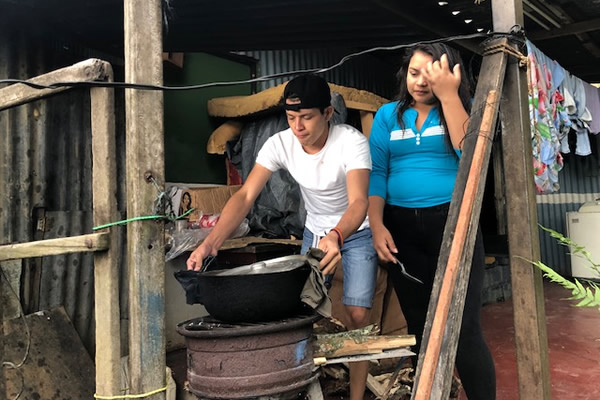
Two Nicaraguan refugees prepare rice and beans at the home outside San José, Costa Rica, where they are living. Hunger is among the many challenges for LGBTI Nicaraguans in Costa Rica who have fled violence associated with President Daniel Ortega’s regime’s efforts to quash anti-government protesters. (Photo by Armando Trull)
Arlen fled Nicaragua after she was flagged by security forces as one of the main providers of food, supplies and medicine to youth holed up in multiple barricades throughout Managua.
“Paramilitary crashed the door of the house where I was living,” she says. “Fortunately, I wasn’t there. That same day I headed to Costa Rica with just the clothes on my back and the little money I had.” It’s pretty much the same story for most of the youth here, fleeing one step ahead of paramilitary thugs under government orders. This humble home has indeed been a refuge. The youth share wafer thin mattresses on the floor. They huddle together like lost children, under multiple worn blankets that barely protect them from the cold sweeping up from the floor and hovering overhead. They hug battered teddy bears. On the walls, rainbow flags and even a unicorn.
“We have become like a family,” says Magdiel, one of the group’s leader, as he shivers beneath a blanket. “The older take care of the younger. We share what little we have even our body heat at night.”
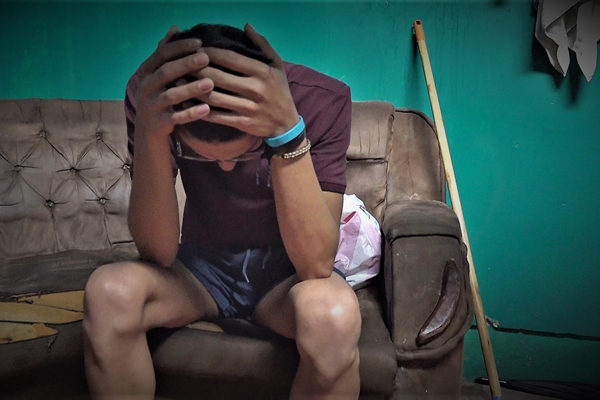
A gay man from Nicaragua sits in a house in San José, Costa Rica, after he fled violence in his homeland. (Photo by Armando Trull)
In one corner of the house towards the rear a slight young man and a blonde girl sit on a battered donated sofa talking about how much they miss their families. “I had always lived within the warm and loving embrace of my papa,” she says and then bursts into tears, the sobs coming like a tidal wave. Soon the young man is also crying and so are the other youth nearby. “We are so young, so inexperienced and innocent,” says Ulises in a cracked voice as he watches the youth embrace one another. “We long for our families so very much. It’s very painful. We did what we believed was right. We stood up against oppression.” But returning home is not an option, it could place not only them but their families in danger. So Hijos del Arco Iris LGBTI is giving these youth purpose. They participate in weekly activities such as cleaning up public parks, dance lessons and free haircuts.
“We want to show people in costa Rica that we can be a positive force in the country that has welcomed us,” says Ulises. The youth also participate in workshops to learn survival skills in a new society including how to apply for asylum.
‘A humanitarian crisis’
As undocumented refugees seeking asylum in Costa Rica, these gay youth face an uncertain existence. Unable to work legally, unused to paying for healthcare and with little support they are surviving in crisis mode. More than a million Nicaraguans have fled the political violence and the economic collapse of the country since April says Marcela Farrach, a caseworker for RET International, an international relief NGO. It’s likely that thousands of LGBTI Nicaraguans are part of that diaspora says the young woman. Farrach has been working on a pilot program sponsored by the U.N. High Commissioner for Refugees to help Nicaraguan refugees and asylum seekers in Costa Rica. “They are extremely vulnerable and the funds to help them are insufficient especially as the number of refugees continues to multiply. It is a humanitarian crisis,” Farrach says.
‘I was terrified I would be tortured and raped’
Some Nicaraguan gays have managed to escape to other parts of the world where they have a better second chance at life, including Spain. That is the case for David.
The 23-year-old gay rights activist and vlogger came under government scrutiny for posting videos of his participation in the peaceful marches and subsequent postings calling out the Ortega regime’s violent crackdown. In one tearful clip, a clearly distressed David with mascara running from his eyes says, “They are sending their thugs and mobs armed with guns, knives, rifles and shotguns. I don’t want my country to become another Venezuela. I don’t know where this will end.” For David it ended in October after a gay friend Denis Madriz was found shot to death a few days after disappearing. Madriz had been active in the protests and an iconic photo of him holding a large Nicaraguan flag had made the rounds of social media. “I feared I was next,” he says. “Human rights organizations had fled the country after death threats. There was no one left to protect us.”
David crossed the border by bus to Costa Rica and after a few months of despair fled to Spain where he met two gay childhood friends, Victor and Justin. They also participated in the protests, providing food and drink to protesters. The slim young men are university students, one an industrial engineering major the other a psychology major. They both have white blond hair and that made them easy for government informants to finger them. A phone video recorded by Justin’s mother and aunt captured the night two armed paramilitary thugs came to arrest them.
“We are here for the two blondes, the terrorists participating in the protests,” says one of the thugs. The women denied the boys were there. “We don’t know what you are talking about,” they said defiantly. The thugs insisted and tried to break in the home and the women became shrill. Ultimately the thugs relented leaving with a final warning, “We were told they were here, we have their photos. We are coming back and we are going to fuck them up!” The youth had left the day before. Justin who is 5’5″ and weighs 120 lbs. and besides going to college was a professional makeup artist and manager at a family meat market. He says calling him a terrorist was an absurd but convenient label cooked up by the Ortega regime to arrest and disappear peaceful protesters.
“I was terrified that If I were to be arrested I would be tortured, raped, because that’s what they do to gay people and then disappeared,” says Justin, noting LGBTI protesters have been singled out for crueler treatment because of the homophobic nature of Nicaraguan society.
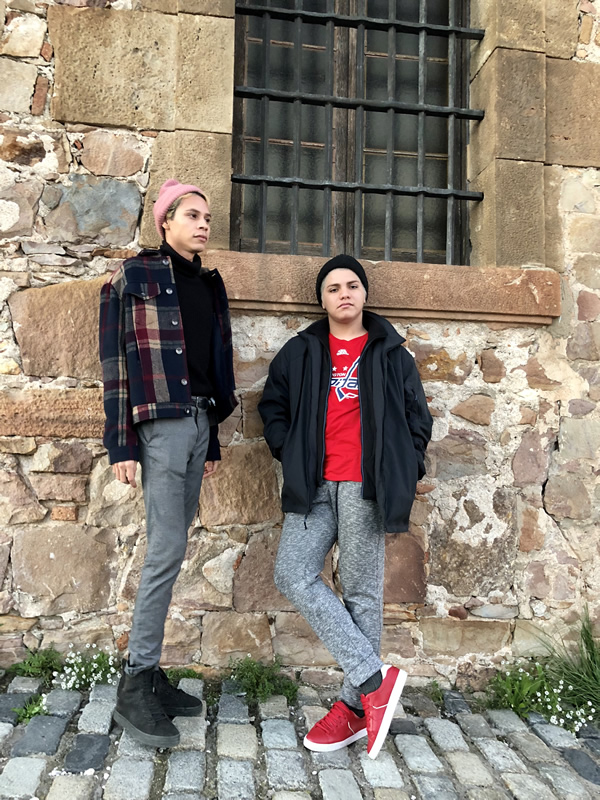
Victor and David say they feel safe in Barcelona because their rights as gay refugees are respected, but they admit that finding a place to sleep and even food is a daily struggle because they lack legal status. (Photo by Armando Trull)
Discrimination based on sexual orientation and gender identity was commonplace in Nicaragua before the protests broke out, but the Ortega’s government and specifically Vice President Rosario Murillo, who is Ortega’s wife, made some overtures to the LGBTI community.
The government in 2009 created the Special Ombudsman for Sexual Diversity position within its Office of the Human Rights Ombudsman. The country’s Health Ministry in 2014 issued a resolution that bans discrimination based on gender identity and sexual orientation in health care.
Murillo has appeared on Nicaraguan television with a trans woman who graduated from a prominent university with a communications degree, but the LGBTI community continues to face harassment and abuse from police officers and soldiers. Efforts to enact an LGBTI-inclusive nondiscrimination ordinance in Managua and in other cities have stalled because of the unrest. Most LGBTI groups not supportive of the government have closed their doors as their leaders and members have fled the country.
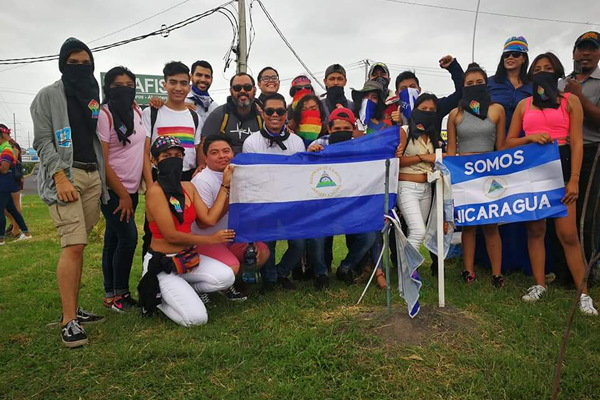
LGBTI activists participate in a Pride march in Managua, Nicaragua, on June 28, 2018. (Photo courtesy of William Ramírez Cerda)
‘Here I feel safe and welcome’
In Barcelona; Justin, Victor and now David have found a welcoming gay community that has helped them through the process of integrating into Catalonian and Spanish society. Their first stop was the community organization STOP SIDA, which means STOP AIDS. “We have lawyers who provide legal advice on how gays who are victims of violence because of their sexual orientation or gender identity can apply for asylum,” says Luis Villegas, co-manager of STOP SIDA. Villegas says the organization provides information on how to integrate into Spanish society.
“We also have social workers who provide them with resources on how to survive and thrive and ways for them to participate in workshops and outreach efforts,” he says. The youth applied for empadronamiento, a status that allows undocumented refugees to access a wealth of social and health services in Spain. They were helped to process asylum applications that would ultimately result in a NIE, an alien identification number that allows them to work as their asylum case is decided. “We are proud that as a community we are able to help fellow members of our community who are vulnerable and at risk,” says Villegas.
Victor is very grateful for that help. He tells me so as we walk through Plaça d’Espanya on a beautiful crisp fall afternoon. A pair of police officers smile and nod prompting a comment from Victor. “I was very afraid of cops when I first arrived here,” he says. “I know that in most places police are here to protect you but in my country they kill us. In Barcelona, I feel protected, I feel my rights are valued, you know?”
But life in Spain isn’t easy for these gay Nicaraguan exiles. They work in the underground economy, walking dogs, doing hair and makeup or as waiters. Sometimes they stand in soup lines to save the little they make in order to pay rent. The young men rent a small bedroom in a fifth-floor walk-up apartment in a rundown building. It’s in a working-class Barcelona neighborhood known as Venezuela because so many Latino immigrants live there. It’s a step up from when they first arrived says one of the young men. “We had to spend the night with our dates because we had nowhere to sleep, it was either that or the parks,” says Victor.
Shortly after that conversation, Justin and Victor were given NIE cards and David received empadronamiento The youth are very fortunate and on their way to a new life in Spain although the process is still many months from ending. For Hijos del Arco Iris LGBTI back in Costa Rica, it’s a much more difficult process in a poorer country straining under a refugee and humanitarian crisis of staggering proportions with fewer resources.
Yet all of these gay Nicaraguan youth face every day with optimism, dignity and hope. Living proof of the truth of their motto Juntos somos un volcán or “United we are a Volcano.” This volcano roared on April 19 and has continued to roar in Nicaragua and now roars in exile- Randal says his community fought for the rights of all Nicaragua and for a country where in the future the rights of all will be respected “for justice, for equality for what all of us as human beings deserve.”
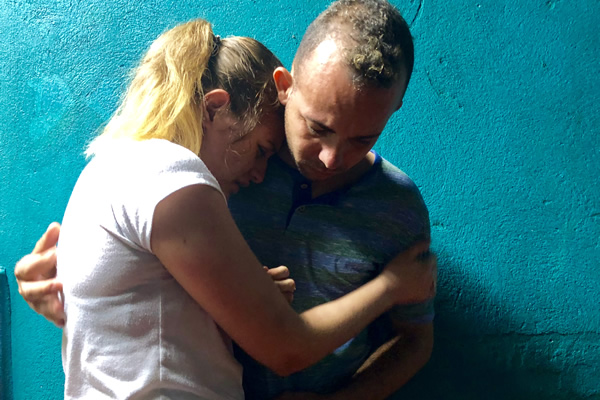
Two LGBTI Nicaraguans who fled violence in their homelands embrace in the house in San José, Costa Rica, where they are currently living. (Photo by Armando Trull)